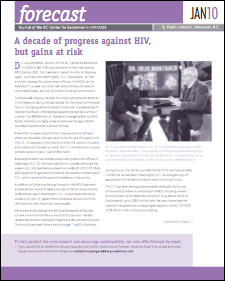A decade of progress against HIV, but gains at risk
Dr. Julio Montaner, director of the BC Centre for Excellence in HIV/AIDS (BC-CfE) and president of the International AIDS Society (IAS), has travelled in recent months to Moscow, Japan, Germany and Washington, D.C. Everywhere, he had a simple message for government officials: HIV/AIDS can be defeated if Canada and other G8 nations follow the lead of the United States, and live up to their funding commitments.
During a wide-ranging interview focusing on progress and setbacks in HIV treatment during the past decade, Dr. Montaner commended the U.S. for playing what he called a ‘critical role’ in accelerating HIV treatment and care in the developing world. He pointed out that if it weren’t for PEPFAR (the U.S. President’s Emergency Plan for AIDS Relief), the rollout of highly active antiretroviral therapy (HAART) would be nowhere close to where it’s today.
“If we often complain about the fact that we are only half way where we should be, the real reason is not for lack of support from the U.S., it’s because of the inability of other G8 nations, including and in particular Canada, to match the U.S. contribution on a gross domestic product basis,” said Dr. Montaner.
Following his recent visit and discussions with government officials in Washington D.C., Dr. Montaner said the U.S. is ready to embrace the made-in-B.C. HIV treatment-as-prevention model (BC-CfE STOP HIV & AIDS) as part of its agenda to combat the HIV epidemic in Washington, D.C., which has one of the worst HIV epidemics in the country.
In addition to furthering the way forward in HIV/AIDS treatment and prevention with HIV experts and senior White House officials, Dr. Montaner was in Washington, D.C. to participate and show solidarity for the U.S. government’s landmark decision to lift the HIV travel ban after more than two decades.
“We are extremely pleased that HIV-positive people will be able to have a more normal life as a result of this decision. The ban represented another example of stigma and discrimination at work. This should have been done a long time ago,” said Dr. Montaner.
On his way home from Washington, D.C., Dr. Julio Montaner was a guest on CBC’s The Hour in December 2009. In conversation with host George Stroumboulopoulos, Dr. Montaner stressed that it’s critical for the G8 nations, including Canada, to live up to their funding commitments in order to conquer the HIV/AIDS epidemic.
During his visit, the IAS announced that the 2012 International AIDS Conference will be held in Washington, D.C. as a tangible sign of appreciation for the administration’s work in striking the ban.
The U.S. has been setting several excellent examples for the rest of the world to follow in combating HIV/AIDS, including a recent announcement by the National Institute on Drug Abuse (NIDA) to fund research up to US$50 million over five years to evaluate the treatment-as-prevention strategy (again based on the BC-CfE STOP HIV & AIDS) in the criminal justice setting

